blog
We don’t believe in waste of any kind, not just resources, but also time, energy, ideas or money. Life is short; we don’t want to waste it. Here you can delve deeper into the work with do with our customers by reading our binit blogs.
We don’t believe in waste of any kind, not just resources, but also time, energy, ideas or money. Life is short; we don’t want to waste it. Here you can delve deeper into the work with do with our customers by reading our binit blogs.
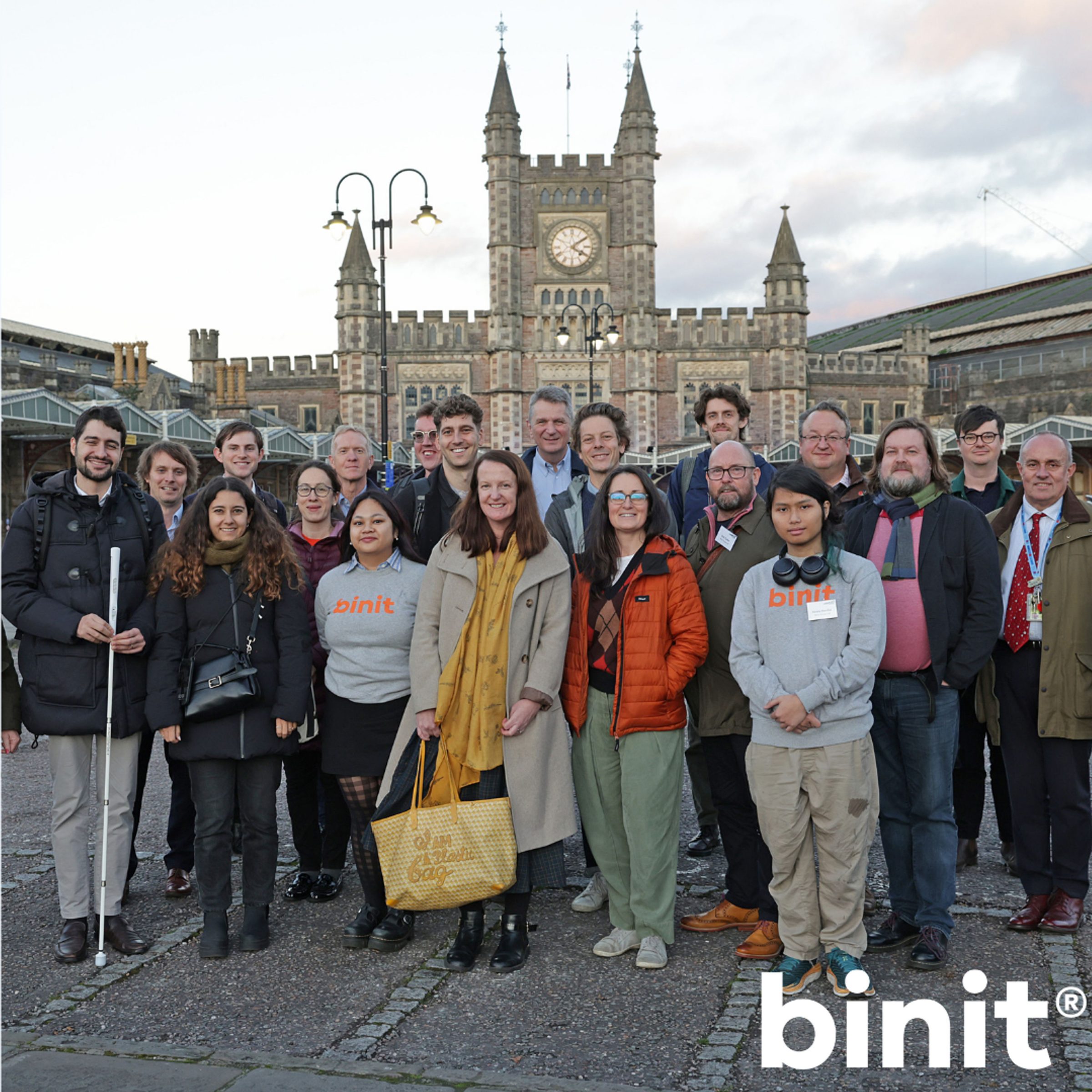
20.11.24 BRISTOL, Connected Places Catapult, the UK’s Innovation Accelerator for cities, transport and place leadership has today announced the latest organisations to join the Station Innovation Zone programme. Eight organisations with concepts aimed at enhancing accessibility, sustainability, personal safety, and overall passenger experience have been selected to develop proposals to trial their innovations at Bristol Temple Meads.
In the coming months, Connected Places Catapult will support the selected organisations as they progress through the Station Innovation Zone —a multi-million-pound programme hosted at Bristol Temple Meads in partnership with Network Rail. Early next year, three will be selected to move forward to live trials with their ideas being tested at the station.
This initiative breaks down barriers to innovation, creating a platform where rail technology innovators, buyers, and investors can collaborate to shape the stations of tomorrow. The programme has already supported 20 innovators with 6 conducting trials over the past two years.
The latest organisations welcomed onto the Station Innovation Zone programme and their innovations are:
WeWALK – Supporting visually impaired passengers to travel independently with WeASSIST, a real-time navigation tool within the WeWALK app. Co-designed with RNIB (Royal National Institute for Blind People), trained agents will guide users through key station tasks, offering a scalable accessibility tool for all rail networks.
Therapy Box Ltd – Developing an intuitive, location-aware communication aid to help passengers with communication needs to navigate their rail journey confidently. This web-based AAC (Augmentative and Alternative Communication) tool gives users access to helpful vocabulary for each station area.
Journey Alerts– Offering a friendly ‘virtual companion’ to guide anxious passengers with real-time, step-by-step instructions from start to destination. This tool eases the most anxiety-inducing aspects of rail travel for a smoother journey.
Ampetronic Limited – Ampetronic’s AURI system is designed to make audio accessible for everyone. It streams high-quality sound straight to hearing aids, cochlear implants, smartphones and any Auracast-enabled devices (e.g. earbuds), so users won’t miss the last call for their train again!
Transport Direction – Pioneering a targeted lighting and sound system to help passengers move around the station with ease. Using projectors and a focused speaker system, it will display key information and guide passengers to platforms, facilities, and help points.
Binit Group Ltd – Turning stations into cleaner, more sustainable spaces for passengers and the environment. Using data, analytics, and new, patent-pending hardware to track and manage waste more effectively.
Dewhurst Ltd – Creating a lift emergency communication system to make stations safer and more accessible for passengers who are deaf or hard of hearing and non-verbal. With a text screen, audio phone, and camera, passengers can be confident that help will be there when they need it most.
VM Systems Ltd – Bringing the outside in, this living wall will boost biodiversity, help with temperature control, attract more insects, and create a greener, more inviting space for passengers. It’s an eco-friendly step towards transforming stations into vibrant hubs for all living creatures.
The companies in this cohort are participating in the third year of the Station Innovation Zone, building on previous testbed and trial activity achieved since 2022.
“I’d like to congratulate this latest group of businesses selected to join the Station Innovation Zone programme at Bristol Temple Meads. By embarking on this journey of innovation, these innovators are not just trialling new solutions but helping shape the future of stations and the wider rail experience”- Dr Alan Peters, Ecosystem Director – Rail and Stations at Connected Places Catapult
“We are really excited with our recently selected SME cohort on the third year of our Station Innovation Zone in partnership with Connected Places Catapult. Along with GWR and the wider industry, we will be supporting them to develop their ideas into trial proposals that could be selected to enter live testing later in the year. This year’s selected cohort offer exciting innovations that have the potential to provide passengers with a more accessible, inclusive and sustainable environment and enhance the station experience for all customers at Temple Meads.”- Brian Wortman, Programme Sponsor at Network Rail
Find out more about the Station Innovation Zone programme here.
The Station Innovation Zone programme is being delivered by Connected Places Catapult in partnership with Network Rail and is supported by Innovate UK.
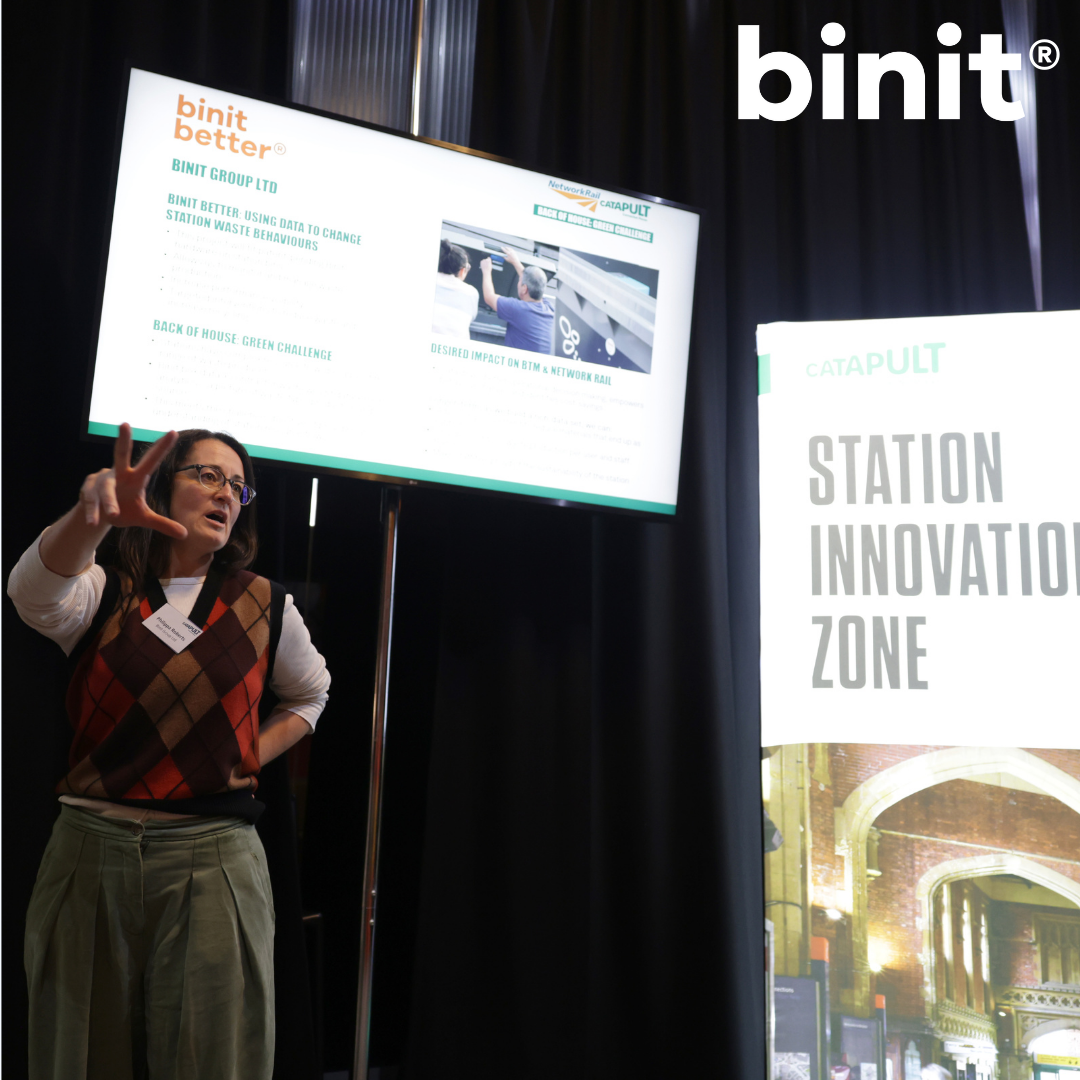

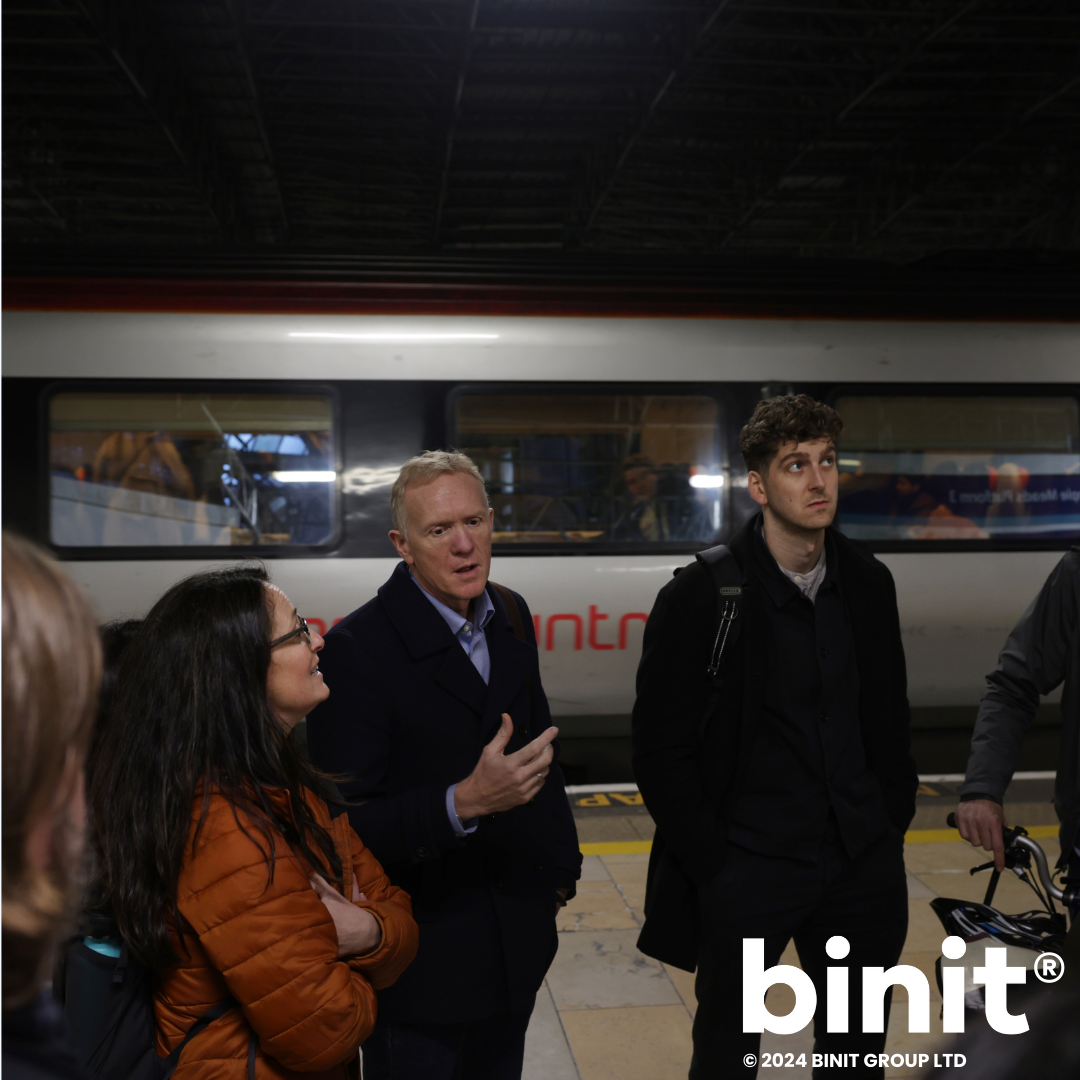
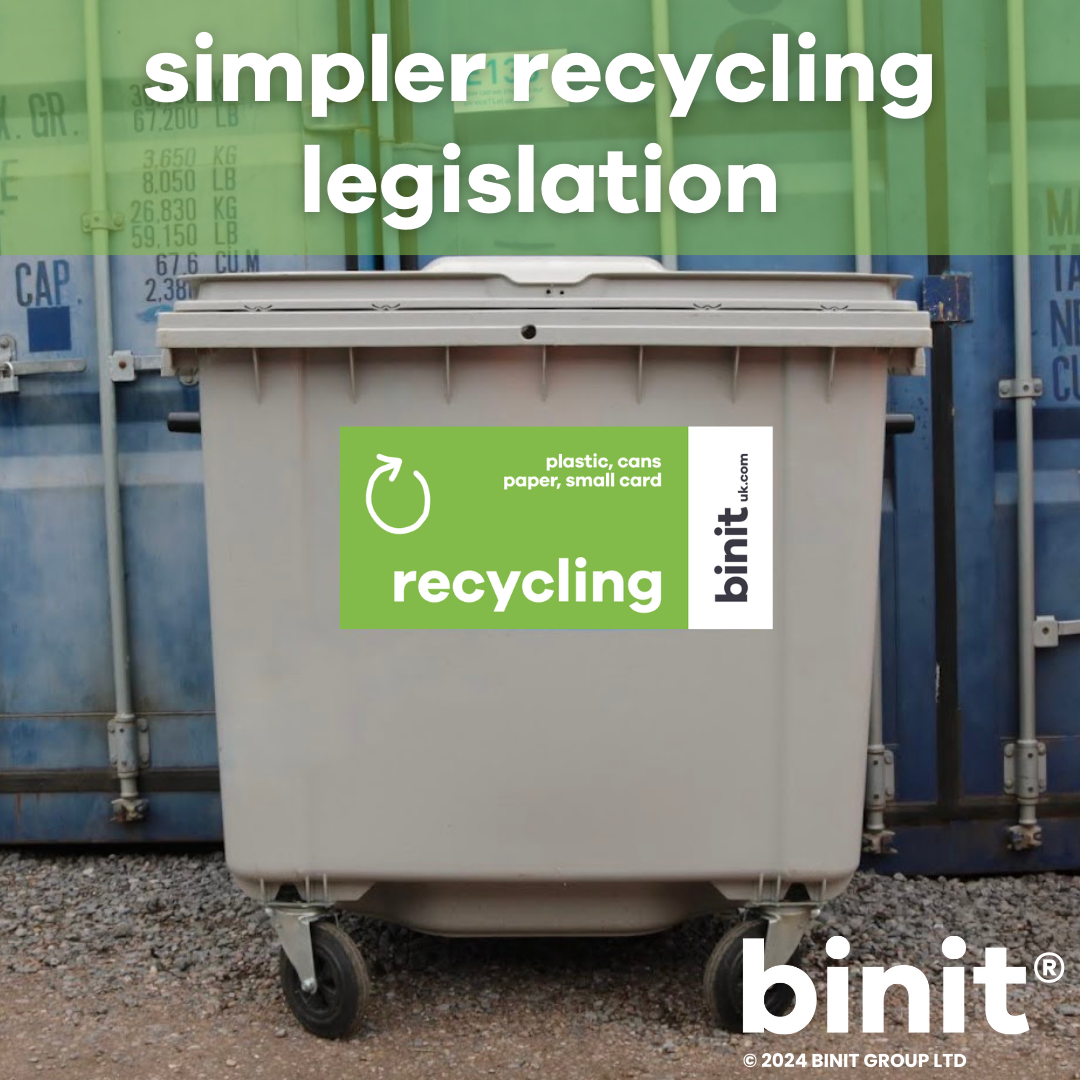
Please note that at present, we do not accept glass in our recycling bins. This will remain a separate collection stream.
Businesses, non-domestic premises and micro-firms: by 31 March 2027
The new legislation is expected to have a positive impact on communities by:
We will provide you with further updates as we receive them. If you’d like to learn more, you can email sara@binituk.com or contact us.
Read more about the legislation here: https://www.gov.uk/…/consis…/outcome/government-response
The simpler recycling legislation set to take effect on March 31, 2025, represents a significant step forward in sustainable waste management. By making recycling more accessible, the legislation aims to foster a culture of environmental responsibility and efficiency. As communities and businesses adapt to these changes, the ultimate goal is a cleaner and more sustainable environment for future generations.

The Bull Inn, Totnes, Devon.
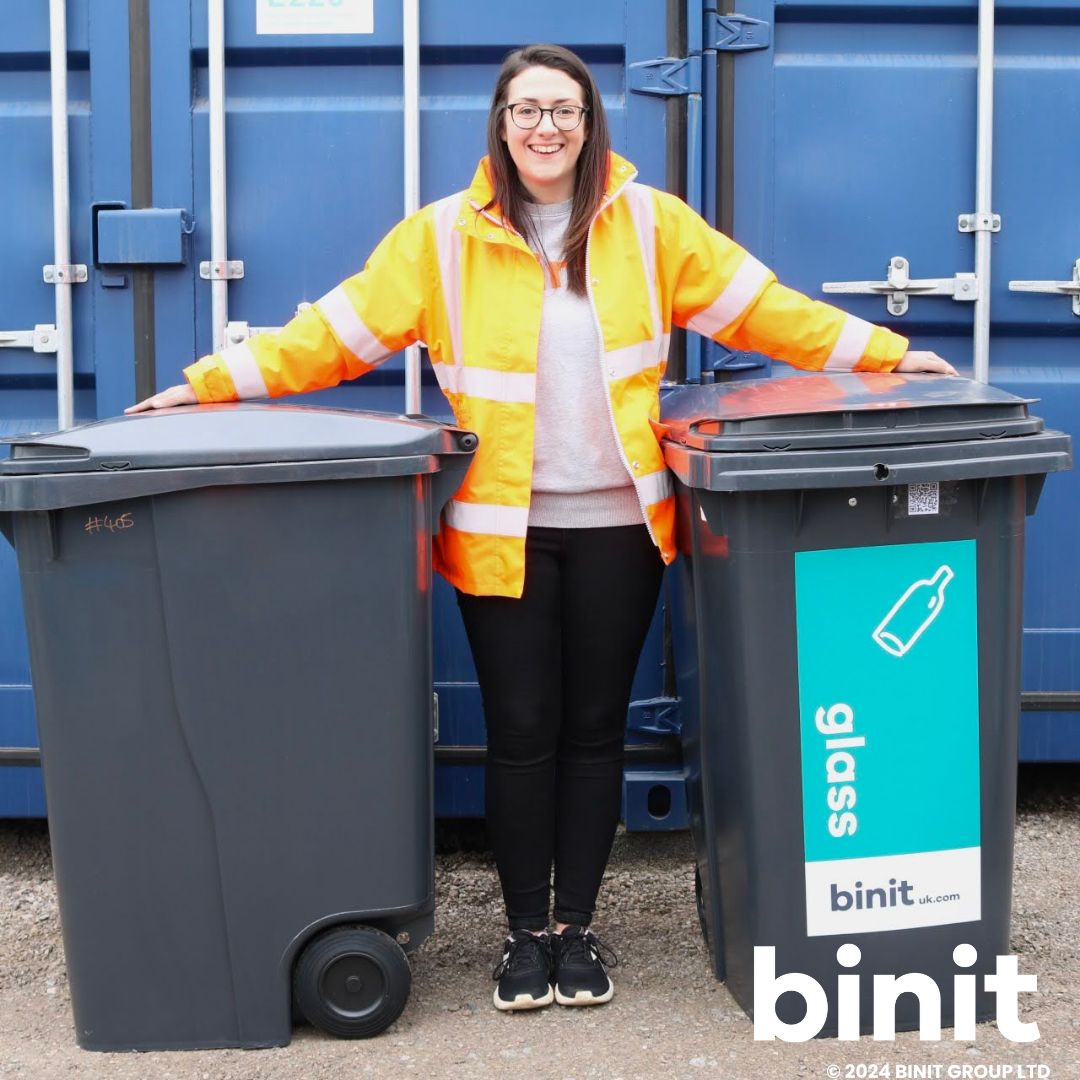
A strategic approach to business waste management can transform your operations. Understand the waste hierarchy: reduce, reuse, recycle, recover, and dispose. Reduction minimizes waste at the source, saving costs. Reusing materials extends their lifecycle and reduces procurement needs. Recycling turns waste into resources, closing the loop. Recovery extracts energy, offering dual benefits. Disposal is the last resort, and proper handling avoids penalties. Mastering this framework aligns your business with waste net zero goals. Believe in the power of structured waste management for sustainability.
Which part of the waste hierarchy challenges your business the most?
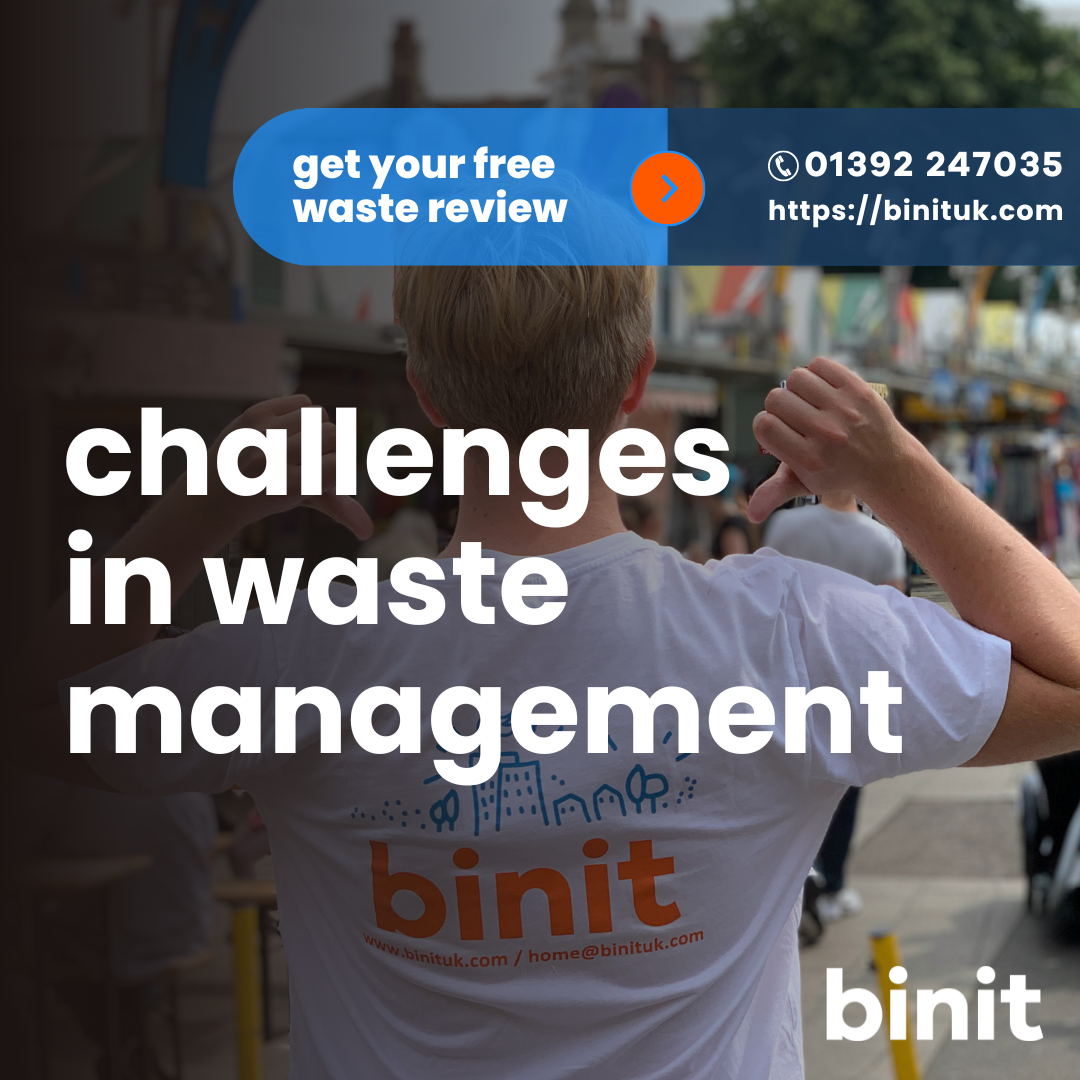
“Waste management can be a complex business area… but it doesn’t have to be.”
All businesses in the UK are legally obliged to:
Read more here: Dispose of business or commercial waste: Your responsibilities – GOV.UK (www.gov.uk)
Ineffective recycling
If you are not separating out your recycling from your rubbish, its a decision that’s not only bad for the planet, but also for your wallet. Recycling tends to be made up of bulkier items such as cardboard or plastic bottles. Did you know?: Recycling collections are typically cheaper than rubbish collections, sometimes by nearly half the price! If you are recycling correctly, you’ll be saving quite a lot of money. Before putting it in the bin, remember to flat pack your cardboard to ensure more space for your other recycling materials.
Time constraints
We understand that there may be time constraints you face as you are busy. By having clear signage or organising your bins in an easily accessible place to you; you may find it becomes easier to separate out your waste into the right bins and save the hassle of figuring out what goes in what bin or walking too far to empty your waste.
Utilising or purchasing products with packaging waste
If you use or purchase products that lead to a lot of packaging waste, such as plastic bottles or paper cups, you may want to consider changing this. Instead of using single-use products, you can slowly implement reusable products or find substitutes that will create less waste such as refills. This way, your business will be producing less waste and this is something you can practice at home too!
Improper disposal of Waste Electrical and Electronic Equipment (WEEE)
WEEE materials you might most commonly dispose off are items like old batteries, cables and monitors. Some people might throw these items in their regular rubbish bins because they may not know that they should not do so. “Every year an estimated 2 million tonnes of WEEE items are discarded by householders and companies in the UK” – Waste Electrical and Electronic Equipment recycling (WEEE) (hse.gov.uk) If not recycled properly, these materials will lose their value and if exposed to certain materials or chemicals, can be extremely flammable and hazardous. If your business produces a lot of WEEE, do get in touch with us and we can help you set up a WEEE service here.
Behaviour change
Start with yourself. If you can identify practices that would be achievable and practical for you to recycle better or manage your waste better, it will be easier to cascade and share these practices with your colleagues or your household members. It could be something like properly recycling food waste and separating it from your rubbish completely. Practice habit stacking and build new practices slowly after you have mastered your first one. Reinforce positive behaviour at your workplace and set KPIs so you can continuously improve your efforts.
Efficient waste management in line with legislation
With new legislation, businesses have to implement separate recycling and food waste collections by the end of March 2025 (with the exception of micro-firms that will be required to have collections in place by the end of March 2027). Read more here: Government response – GOV.UK (www.gov.uk)
Utilise data and analytics
Understanding your waste stream through data provides a bigger picture of your company’s usage of materials like paper and plastic. Monitoring this usage helps reduce the amount of waste produced. Read more here for the benefits of smart waste management.
© 2024 BINIT GROUP LTD
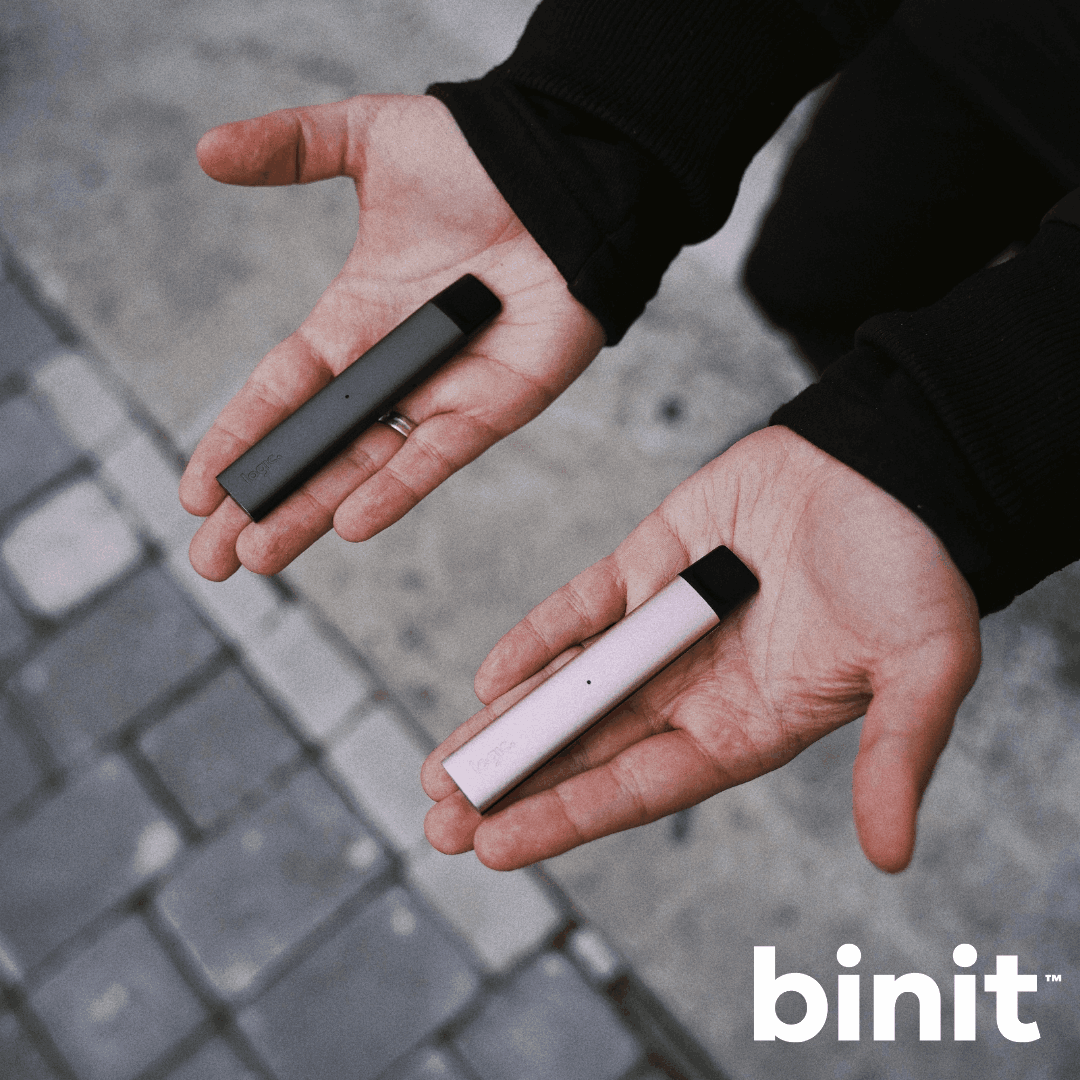
*Please review this post, even if you feel it may not be relevant to yourself.*
We have been made aware that disposable and reusable vape pens and pods are being disposed of within Binit bins and containers.
We advise you that vape pens and pods pose a serious fire risk when tipped into a collection vehicle and at the transfer station. This is due to hazardous materials within these items.
Vapes are classed as Waste Electrical and Electronic Equipment (WEEE). These require a specialised collection. Due to this, these items are not accepted within our Rubbish and Recycling bins.
If you have any concerns or queries, please do get in touch. Email home@binituk.com or ring 01392 247035.
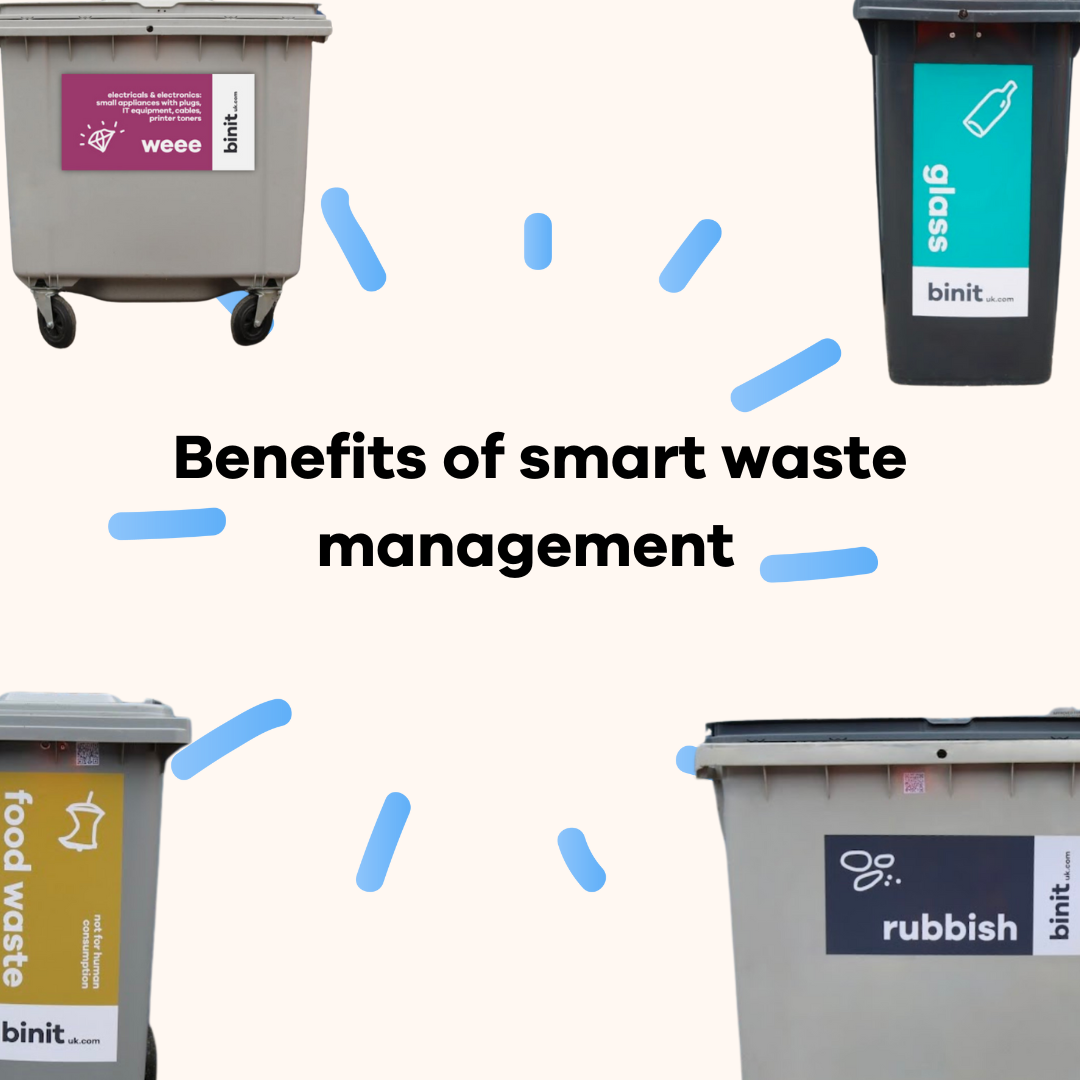
Smart waste management can be a real game-changer for businesses, provided they take the right steps and get the necessary guidance. At Binit, we have found that many SMEs spend more time fixing problems with their waste services than they do on the actual cost of the service. This highlights the need for businesses to re-evaluate how they manage their waste. Not only does smart waste management play a significant role in reducing carbon emissions, making businesses more sustainable and reducing their impact on the planet. It can also help you reduce costs in the long run.
Start by conducting a waste audit to understand and streamline the different kinds of waste produced. This allows you to create an optimised plan, reducing the number of waste collections needed on a daily basis. A waste audit can also give you a better understanding of the areas where you can focus on reducing your waste.
Understanding your waste stream through data provides a bigger picture of your company’s usage of materials like paper and plastic. Monitoring this usage helps reduce the amount of waste produced. At Binit, we believe that nothing should be wasted, which is why we provide regular reports on your waste via our intuitive dashboard.

Education is crucial in smart waste management. Many workplaces fail to properly educate staff on responsible consumption and waste disposal, leading to unnecessary tension. Simple, clear instructions and an adequate bin system are essential. Everyone should be able to find the right bin for the right waste easily.
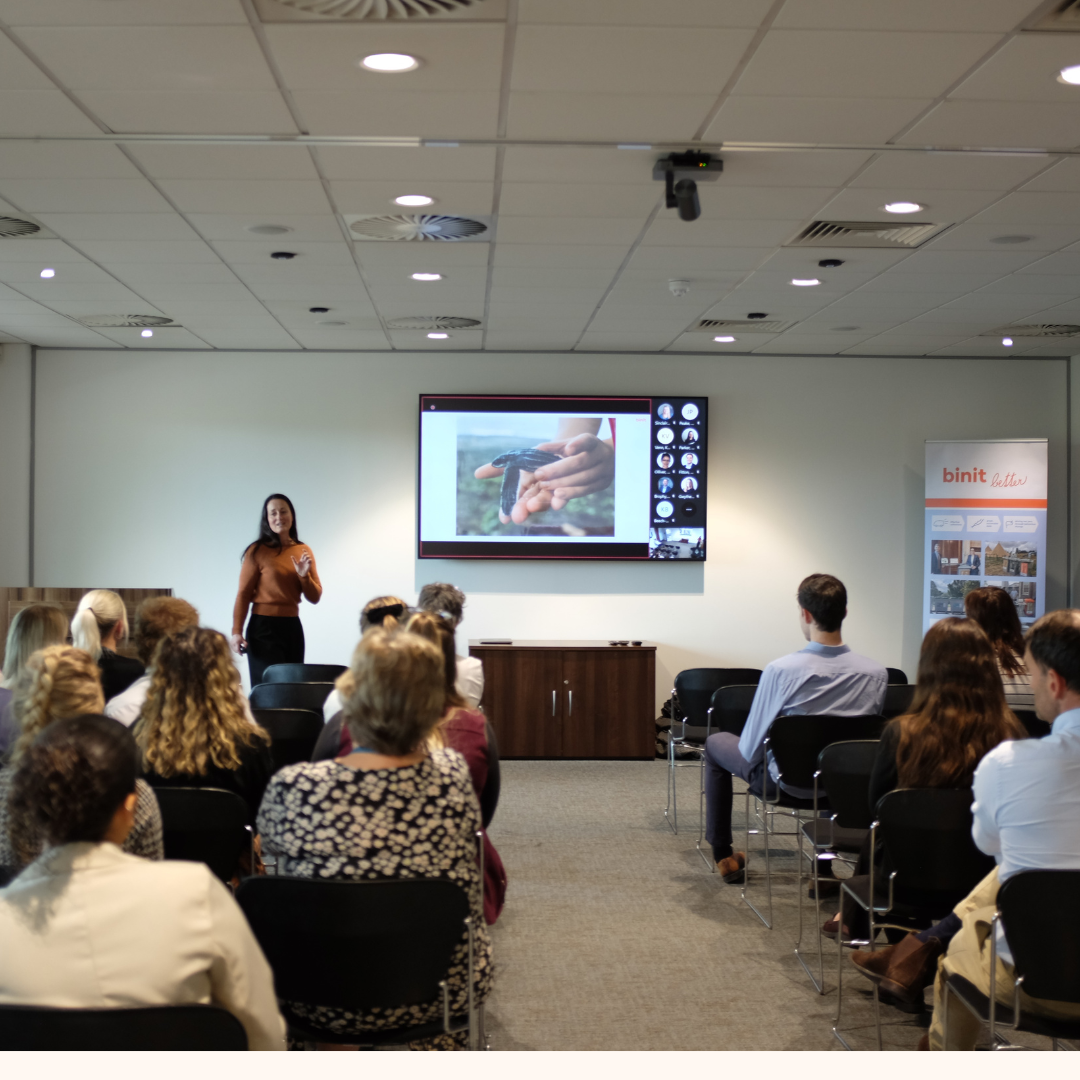
Waste management training can lead to significant savings. Teach employees to reduce waste, from refusing unnecessary packaging to reusing materials. For example, providing free food items like fruits can boost morale and reduce the need for plastic-wrapped snacks.
Smart waste management can help you start your journey towards B-Corp and net zero certifications. These certifications add value to your brand and prepare you for future sustainability and emissions legislations, which will become more challenging for businesses.
At Binit, we are experts in waste management. We can help businesses manage their waste, provide valuable data, and accomplish your goal to achieve B-Corp status. We are on a mission to Binit Better, for your business and our planet.
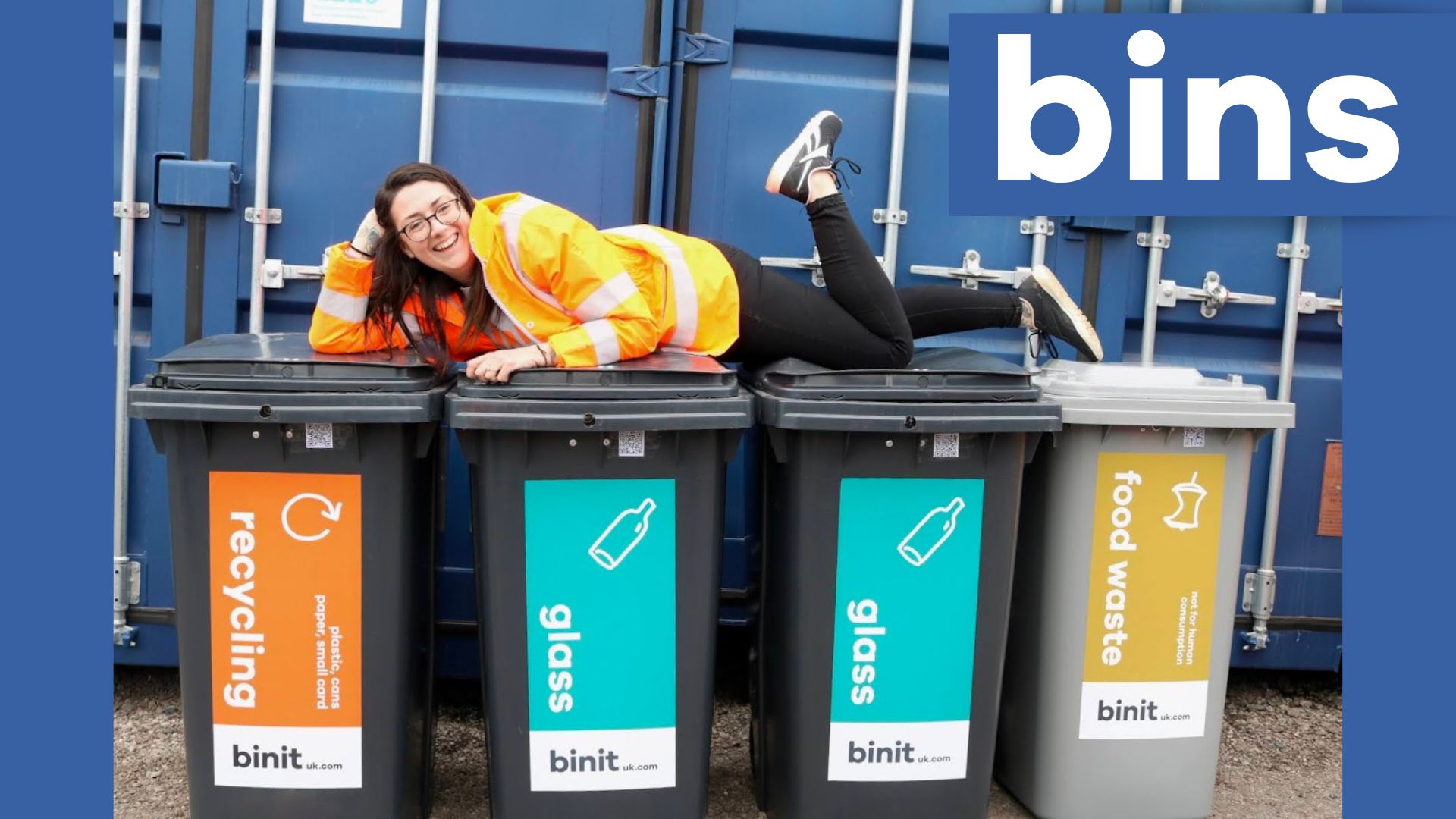
Are you looking to get started with your bins? Or maybe you’re just looking for a change and unsure which bin might be the best fit for your business. Here’s a visual breakdown so you can decide what bin sizes are the best for you!
For example, if you have a lack of bin storage space, we can suggest that you have 240L sized bins of waste streams that you produce the most (e.g. food waste) which you can arrange to be emptied multiple times a week. This should help manage your capacity.
On the other hand, if space is not an issue, we would suggest you go with a larger bin (e.g.1100L) which you can arrange to be emptied less frequently. This would help lower your carbon impact with less miles traveled!
Interested in any of our gorgeous bins? Get in contact today through home@binituk.com or 01392 247 035
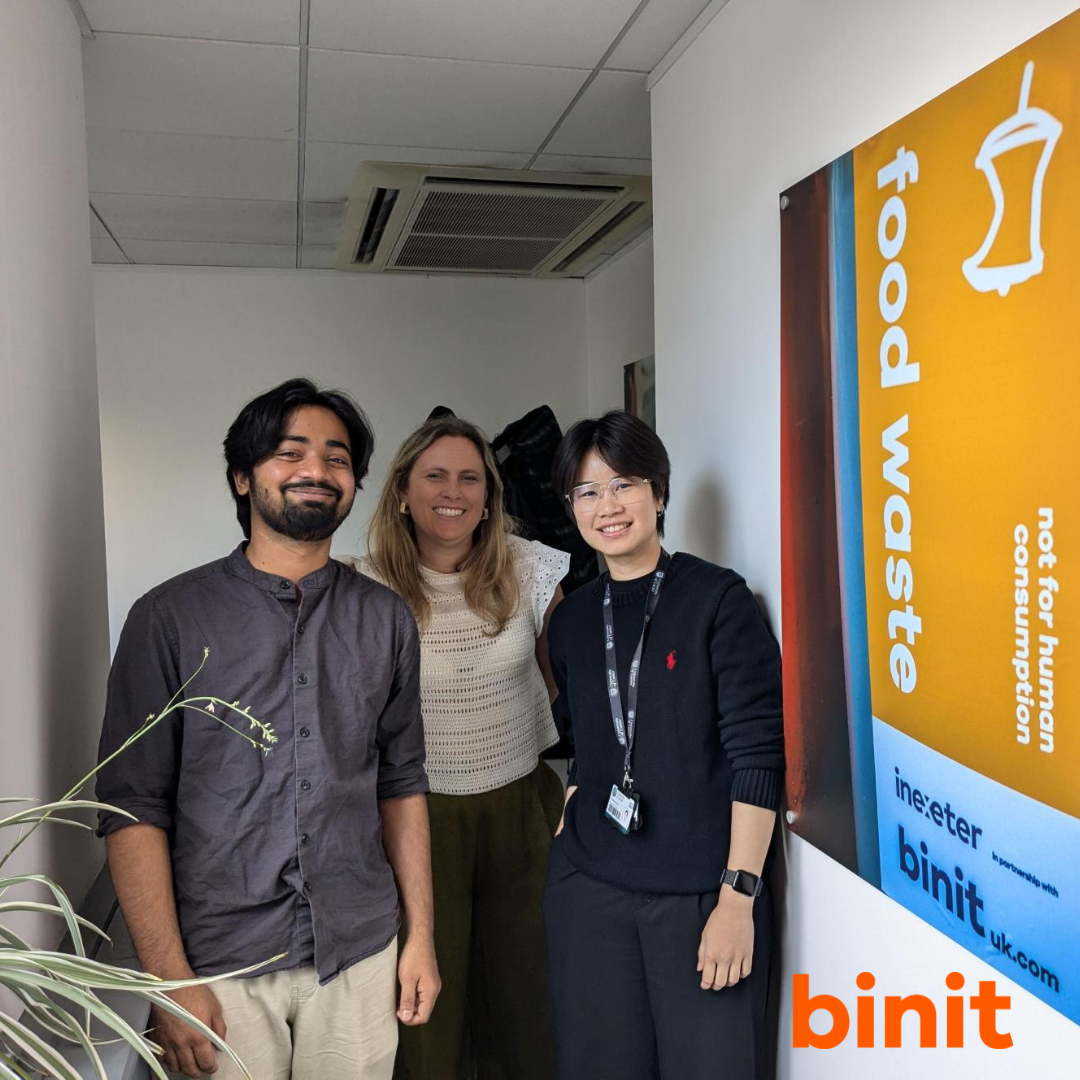
Last Week, Binit’s marketing and communications team visited the InExeter office located in the historic Exeter Guildhall. We were greeted with open arms and genuine enthusiasm by their team.
InExeter is a Business Improvement District (BID) that works tirelessly to enhance the city centre for businesses, residents, and visitors. They support over 600 businesses by providing services such as marketing, events, and projects aimed at improving the local environment. Hearing about their journey and growth was truly inspiring.
Our chat with the InExeter team gave us a glimpse into their day-to-day operations. From organising exciting events like the Exeter Festival to improving public spaces with beautiful floral displays and public art, their work makes Exeter a more vibrant and attractive place. Their efforts ensure that local businesses thrive and that visitors have a memorable experience.
One of the highlights of our visit was learning about the positive impact InExeter has on local businesses and tourism. Their initiatives draw more foot traffic to the city centre, helping shops, cafes, and restaurants flourish. By promoting Exeter as a top destination, they attract tourists, which in turn boosts the local economy.
We were also impressed by InExeter’s marketing strategies. They use a mix of social media, printed media, newsletters, and local campaigns to keep the community informed and engaged. Their creative approach helps highlight the unique offerings of Exeter’s businesses and encourages both locals and visitors to explore and enjoy what our city has to offer.
Our visit to InExeter was not just informative but also deeply motivating. At Binit, we share their commitment to making Exeter a better place for everyone. We aim to make Exeter a clean place and a city with good waste management service.
Our day with InExeter was a reminder of the power of community spirit and hard work. We left the Guildhall feeling inspired and excited about the future. Together, we can continue to make Exeter a wonderful place to live, work, and visit.
Contact the Binit team today for a consultation on your waste management!

Awards season is truly in full swing! We are very grateful to have become shortlisted as finalists for the National Sustainability Awards 2024! This is for the category Circular and Recycling Award – Product Recycling.
“Although the awards are a celebration, they also serve to show how our society can, with good leadership, be lead through the post-pandemic recovery into a new and more sustainable path. The issues have not stood still, and neither have the solutions, but it is important that these ideas are seen and adopted. We are looking for the best in every category, from finance to renewables, from insulation to water conservation, all are important to ensure that future generations will be able to live in a cleaner, greener world.”
Looking forward to the winners announcement on October 2nd 🎉 !